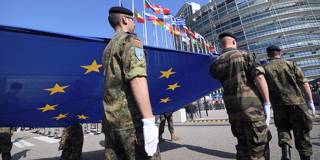Russia’s invasion of Ukraine has shown that Europe can no longer afford to treat quasi-theological arguments over EU and NATO primacy as more important than its own security. While the Alliance clearly remains indispensable to deterring Russia, the EU has a crucial complementary role to play.
LONDON – Russia’s invasion of Ukraine in February was a watershed moment for European security. But relations between NATO and the European Union remain marred by mutual suspicion, institutional rivalry, and a lack of effective cooperation. The two organizations must set aside their differences and work together.
Russia once again poses a long-term threat to European security. At the same time, the economic spillover from the war in Ukraine will intensify security challenges along Europe’s southern flank. And, as the current crisis involving Taiwan has shown, China’s increasing assertiveness will loom progressively larger in America’s strategic thinking.
The key European security challenge in the coming years will be to strengthen deterrence against Russia while retaining the ability to tackle other threats. When it comes to deterring Russia, NATO is clearly the indispensable organization, because there is no viable alternative to its integrated command structure. The Ukraine war has reinvigorated NATO’s core mission of standing up to Russia and defending its members’ territory if deterrence fails. Under new defense plans, NATO’s rapid response force will increase from 40,000 to 300,000 troops. And Finland and Sweden will soon become members.

LONDON – Russia’s invasion of Ukraine in February was a watershed moment for European security. But relations between NATO and the European Union remain marred by mutual suspicion, institutional rivalry, and a lack of effective cooperation. The two organizations must set aside their differences and work together.
Russia once again poses a long-term threat to European security. At the same time, the economic spillover from the war in Ukraine will intensify security challenges along Europe’s southern flank. And, as the current crisis involving Taiwan has shown, China’s increasing assertiveness will loom progressively larger in America’s strategic thinking.
The key European security challenge in the coming years will be to strengthen deterrence against Russia while retaining the ability to tackle other threats. When it comes to deterring Russia, NATO is clearly the indispensable organization, because there is no viable alternative to its integrated command structure. The Ukraine war has reinvigorated NATO’s core mission of standing up to Russia and defending its members’ territory if deterrence fails. Under new defense plans, NATO’s rapid response force will increase from 40,000 to 300,000 troops. And Finland and Sweden will soon become members.